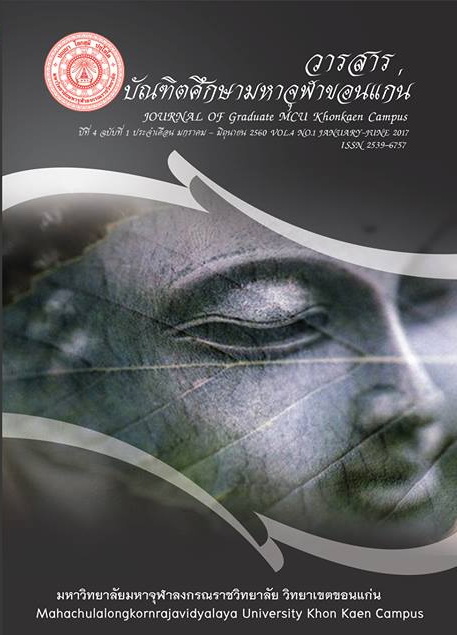ความสัมพันธ์ระหว่างหลักพรหมวิหารธรรม กับจรรยาบรรณของครูที่มีต่อศิษย์
Main Article Content
Abstract
พรหมวิหารธรรมเป็นหลักธรรมที่ครูพึงมีเพื่อนำไปประพฤติปฏิบัติเกื้อกูลแก่ศิษย์และสังคม ซึ่งหลักพรหมวิหารธรรมนี้มีความสอดคล้องสัมพันธ์อย่างยิ่งกับจรรยาบรรณของครูที่มีต่อศิษย์ในปัจจุบัน ด้วยว่าครูที่มีพรหมวิหารธรรมเป็นผู้มีเมตตา กรุณา และมุทิตาต่อศิษย์อย่างสมควร เมื่อศิษย์จะต้องดำเนินชีวิตตามทางที่เลือกแล้วจากปัญญาและกรรมของตนเอง ครูผู้มีอุเบกขาธรรมก็พึงเฝ้าดูด้วยใจที่ปล่อยวาง หากครูผู้มอบความเมตตา กรุณา มุทิตาให้ศิษย์แล้วอย่างเต็มเปี่ยมจะถือว่าพึงเจริญอุเบกขาขึ้นแล้ว ในสังคมไทยนั้นวิชาชีพครูได้รับการยอมรับให้เป็นวิชาชีพชั้นสูง นั่นคือครูจะต้องประพฤติตามจรรยาบรรณของครูที่มีรากฐานมาจากหลักพรหมวิหารธรรม ถ้าครูมีหลักธรรมประจำใจอยู่แล้วก็จะเป็นครูผู้มีจรรยาบรรณที่สมบูรณ์ขึ้น เป็นผู้เปี่ยมด้วยวิชาความรู้และความประพฤติที่งดงาม มีจิตใจเป็นผู้ประเสริฐและเสียสละและมุ่งประโยชน์แก่ผู้อื่นเป็นสำคัญ
Brahmavihāra (sublime states of mind) is a principle that teachers should have to behave to students and society. Brahmavihāra is consistent with the ethics of teachers towards students in the present day, that is to say, teacher who has Brahmavihāra is considered as a teacher with compassion and sympathy towards students. When a student must live according to select his own passage from his own wisdom and own karma. A teacher with Upekkhā (equanimity) should watch his students with pleasure and released. The teacher who he delivers kindness and sympathy to students shall be considered a fully perceiving with Upekkhā. In Thailand, the teaching profession has been recognized as a noble profession, namely, a teacher must keep the ethics of teacher with a foundation of Brahmavihāra. If teacher has the principles of the mind, it is more complete, is full of knowledge and correct conduct and equipped with noble sacrifices and aim to benefit others.

